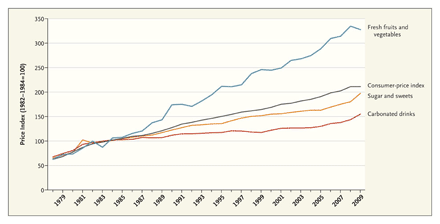The NEJM recently published an article on the public policy case for increasing taxes on sugared beverages. With the recent obesity epidemic, increasing awareness of the current economic times and an heightening emphasis placed on “green” movements, increasing taxes on sugared beverages (from sports drinks to sodas) could help fight all three with a penny-per-ounce tax.
Instituting a penny-per-ounce tax could raise up to $1.2 billion in New York State alone. The tax revenue could be used both directly and indirectly to help fight the obesity epidemic. The revenue raised from this tax could be used to support obesity prevention programs (esp those geared towards children) and to also lower the cost of “healthy” foods. Consumers may be more likely to support the tax if they can see a tangible benefit from their taxes. Additionally, an increase in the cost of the item, would hopefully directly reduce consumption, as consumers would think twice if the price difference between a healthy orange juice and orange soda is decreased. If the increase in tax is substantial enough, it could directly reduce sugar consumption up to 10%.
What I found to be the most shocking is the following figure: The rising cost of fresh fruits and vegetables vs sugared beverages. 
Of course there are many arguments against instituting a sales tax against a specific type of food. One, its food discrimination, why should one food item be singled out over another? And also shouldn’t more focus be placed on education so that the consumer can have the freedom to make an educated decision rather than one externally forced by the government/affordability? And could it possibly lead to something as extreme as the Boston tea party? We may see elementary school kids refusing to pay their tax on their 20 oz soda, throwing it overboard into the atlantic 😉 (the fish would be happily producing more carbonated bubbles then!)
Also, for those economically inclined, they argue that “excise taxes” which would be targeted as a fixed cost per ounce provide incentive to buy less, unlike sales taxes which merely encourage the purchase of less expensive brand names or buying in bulk. “In addition, manufacturers generally pass the cost of an excise tax along to their customers, including it in the price consumers see when they are making their selection, whereas sales taxes are seen only at the cash register.”
But one thing is for sure, that items containing refined sugar have not faced the same price increase as fresh fruits and vegetables, and instead of viewing it as singling out a food item, it could be argued that the market is now focused on equalizing costs. It could help the green movement by unconsciously helping consumers buy “healthy foods”, while also helping to fight the obesity epidemic by reducing accessibility (while still focusing on education). I’m not sure whether taxation is the answer or not (it does seem like quick, easy fix to a deeper problem that needs to be addressed more from the inside), but one thing is for sure is that fresh foods and vegetables (even juices) need to be more affordable.
Here is the article for those interested:
Ounces of prevention
Leave a comment